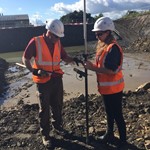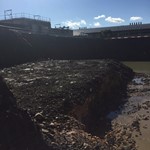Update by Chris O'Brien
The following is an overview of a site placement from Interserve QUEST Scholarship Student Katherine Montgomery:
For the past eight weeks I have been working on site at Horsley Water Treatment Works as a Student Engineer on summer placement. After finishing the first year of my degree it has been really interesting to witness a live construction project, particularly one of this size and magnitude.
The update to Horsley WTW is crucial in continuing to provide excellent quality potable water for the region. During my time here the work has been mainly focused on the excavation of Actiflo and Rapid Gravity Filters area. The rate of excavation is impressive as is the techniques of transporting and compacting the material on site. It is satisfying to see how much development the site has undertaken in such a short period of time.
During the placement I have learnt a lot about the treatment of water. The treatment of the Tyne water is incredibly thorough and precise. The methods of filtering, clarification and flocculation are used to provide low turbidity and high quality drinking water.
By attending weekly meetings I have learnt more about how the staff on site manage to predict and mitigate potential risks. It has also been interesting to see how different companies and specialists collaborate to produce design drawings. The design considers every element of the build, including everything from the piping to the building heights and cladding.
Safety is of the uttermost priority on site and every effort is made by the team to ensure that the upgrade is undertaken in the safest way possible. Regular site inspections also ensure that the project is complying to standards for sustainability as well as health and safety.
During the placement I have been responsible for creating and updating the Interface Schedule, this is a document which lists the work required for each pipe-line diversion. I have also made a live project dashboard which allows staff to view summary statistics for the project.
Additionally during the placement I have undertaken a lot of surveying work alongside other student engineers. We have been responsible for the weekly two-peg tests used to calibrate the devices for levelling. It is important that these instruments are calibrated to within 3mm so that the levels measured on site are accurate. Other equipment has also been used such as a GPS rover, which produces quick and reliable topographic measurements. This is very useful for monitoring the slope of the batter for the excavated works.
The previous eight weeks have provided a very useful insight of the construction industry. The project is a fascinating multi-disciplinary process which requires a lot of commitment, knowledge and hard work from the team.
I have attached some photos of the excavation and the GPS monitoring.
Hope you all have great bank holiday weekend.
Katherine Montgomery
3rd Year Engineering Student



Please Login in order to comment on this update.